Jakarta, Jan 4: An AirAsia jet's engine failed just before its take off from the Indonesian city of Surabaya and the 120 passengers on board were asked to disembark, in the latest incident to hit the airline's flights.
The plane had been taxiing at the Juanda International Airport before takeoff when the engine suddenly died, horrifying passengers, who heard a loud sound, Indonesia's Metro TV reported.
The Bandung-bound plane made it back to the gate and the 120 passengers on board were then asked to disembark while the plane underwent repairs, the report said.
Passenger Yusuf Fitriadi was quoted as saying that a man clad in pilots' uniform told passengers waiting at the terminal that the starter monitor had malfunctioned.
"The plane was ready and moved, but suddenly a loud sound was heard, the sound of the engine disappeared and the plane moved backwards. We were shocked and panicked. The plane was then pulled back to where it parked and we were asked by the stewardess to leave the plane," the passenger said.
The plane was supposed to have departed at 9 pm local time yesterday.
Yusuf said that the airline later told passengers that the flight would be resumed after the issue had been attended to, but about 90 per cent of them refused to re-board the plane, fearing that the fault would reoccur during the flight.
AirAsia then refunded the plane fare of those passengers who had declined to continue with the flight, the report said.
The airline has come under a scanner after its Flight QZ8501 with 162 people on board en route from Surabaya to Singapore mysteriously crashed last Sunday in the Java Sea.
The Indonesian authorities have said that AirAsia had violated the terms of its licence for the Surabaya to Singapore route by flying on a Sunday, the day the aircraft plunged into the Java Sea. The authorities would probe the carrier's other schedules.
However, Singapore said it had approved the Surabaya- Singapore route for AirAsia flights on Sundays after the low-cost carrier's permit was frozen by Indonesia.






Comments
you're in reality a just right webmaster.
The site loading speed is amazing. It kind of feels that you are doing any distinctive trick.
In addition, The contents are masterpiece. you've performed a
excellent process on this matter!
Also visit my blog; Numbers: https://Www.youtube.com/watch?v=UXHr0i7l3_A
Add new comment